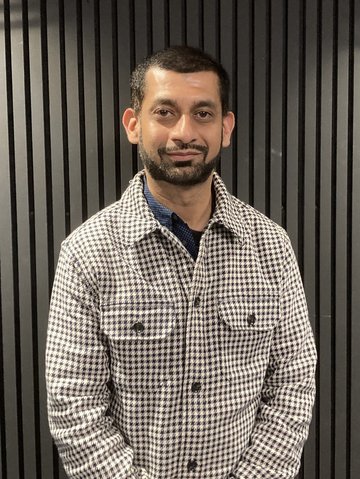
Asif Shakoor
Asif Shakoor was born in 1979, Barking (east London), and is a researcher and writer on South Asian seafaring history
Part of the South Asian Britain oral history collection
About
Asif Shakoor began his career in heritage and history when he discovered documents pertaining to his grandfather Mahomed Gama’s service on the Mercantile Marine during the First World War. Asif talks about beginning to research his grandfather’s seafaring history and tracing his missing service medals, working with archival material to write his forthcoming book Unearthing Invisible Seafaring Histories of Empire. His work tells Gama’s story in addition to those of the earliest recorded South Asian seafarers, continuing to those of the 1950s, and explores the origins and use of the term ‘lascar’ to describe South Asian seafarers. His research into his own generational family presence in Britain has given him a greater sense of belonging in the UK, and he continues to research BAME seafarers, leading walks around the Royal Victoria Docks to tell the stories of his grandfather and of other South Asian seafarers.
The full interviews recorded for 'Remaking Britain', for the South Asian Britain: Connecting Histories digital resource, are available at the British Library under collection reference C2047.
Listen to Asif talking about his family’s long presence in Britain.
Interview conducted by Rehana Ahmed, 10 June 2024.
RA: Do you think that longer history of your family in Britain, is it that that gives you that greater sense of belonging? The fact that you can trace your own personal history, within Britain, through three generations?
AS: I think it does give me a greater sense of belonging, through the fact that my grandfather arrived here so early, settled here so early as well. Because I know from people from the city my grandfather came, settled here in 1962–1967, when the Mangla Dam was being built, they primarily came in 1964 and 1965, so they were given work permits to come here. But my grandfather settled here way before the Mangla Dam was built in 1952...And I mentioned this once to a very top-notch Muslim scholar Dr [–], when he visited my father at home, and he mentioned to me that...When he heard my father speaking English to me, he said to me, ‘When did your father arrive here?’ And I mentioned 1954, and my grandfather came in 1952. And he said to me, ‘So you’re early arrivals’. So it came as a surprise to him as well. I think my grandfather settled here very early. And he also came here very early...Mercantile Marine, in 1913. So it gave me a greater sense of belonging through that, but it also gave me a great sense of pride that, I don't like to think of pride, but an honour to say that he received two war medals for services during the war, in the British Mercantile Marine. And something like 50,000 seafarers, ethnic seafarers served in the First World War, or lascar seafarers, served in the First World War. And Dr Rozina Visram documents in her book Asians in Britain: 400 Years of History. Something like only 2,000 received medals, according to correspondence I've seen at the British Library, in the Indian Office Records. So 2,000 received medals. It's interesting how my grandfather fell in those 50,000, but how he fell in those 2,000. He was one of those lucky ones to receive medals.
All audio and video clips and their transcriptions are excluded from creative commons licensing. This material cannot be reused or published elsewhere without prior agreement. Please address any permissions requests to: remaking-britain-project@bristol.ac.uk
Entry credit
Karishma Kaur
